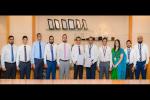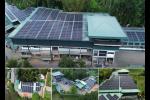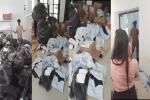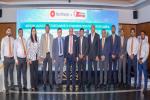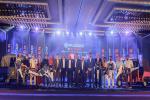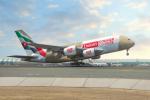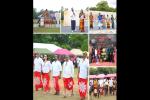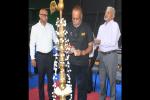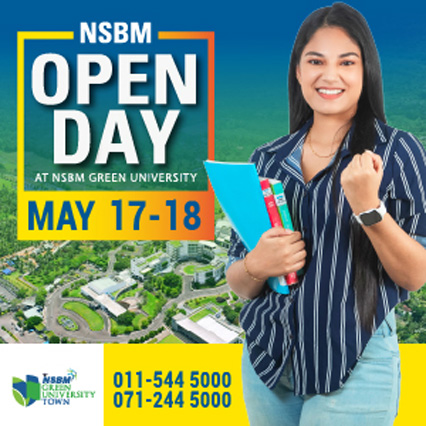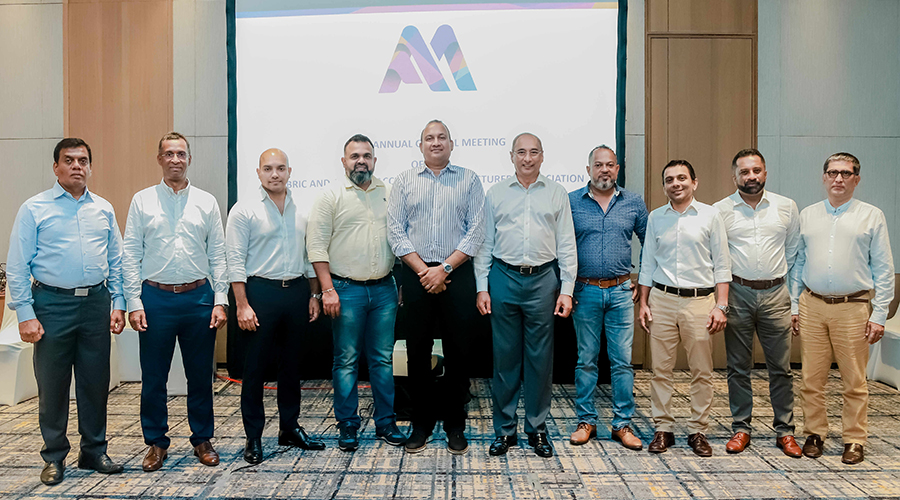Speaking at the 16th Annual General Meeting of the Association, the Chairman of FAAMA noted that the country currently imports most of its fabric requirements and raw materials, amounting to USD 2 billion annually.
"We have tremendous potential in the country.
Most of our fabric requirements are imported, which include 10% synthetic fabrics and approximately 50% cotton.
Only roughly 10% are produced domestically.
When we look at it from a numerical perspective, there's a significant market share we can capture.
But it's not just about the numbers; it's about how we redefine the industry, position our country, and introduce innovation.
It's about creating true vertical integration, encompassing lead times, pricing, and industry flexibility.
At FAAMA, we can seize this potential, establish true vertical integration, and expand into the global market and supply chain," Rajapaksa stressed.
FAAMA also highlighted the sector's risk brought about by the removal of SVAT, citing that it will lead to apparel manufacturers seeking to import more raw materials rather than purchasing them locally from FAAMA membership.
This could result in 15% of their purchase costs becoming entangled in a lengthy refund process.
Meanwhile, the outgoing Chairman of FAAMA, Pubudu De Silva, thanked the membership for their commitment and resilience showcased amidst the economic crisis and COVID pandemic.
He noted that the country has immense potential to strengthen its ability to source materials closer to home.
"I believe that we can contribute even greater value to addressing the challenges within the industry.
At FAAMA, we aspire to go beyond simply promoting Sri Lanka as a destination.
We aim to position the apparel industry as a comprehensive vertical solution.
In every solution we offer, we must emphasize our country's identity as a hub for this industry."
Chairman of the Joint Apparel Association Forum, the apex body of the apparel sector, Sharad Amalean, noted that while the industry is facing a drop in orders, the importance of vertical integration cannot be overlooked.
Strengthening Free Trade Agreements (FTAs) with neighbouring countries like India is essential if the sector is to develop and compete with the likes of Bangladesh.
"We mustn't overlook the opportunity to engage in trade with our close neighbour, India.
There's a substantial market right there, and we need to strategize on how to become an integral part of it.
Currently, we import a significant amount of Indian yarn and fabric, yet our access to duty-free trade with India is severely restricted.
This is a challenge that we at JAAF have taken head-on, engaging directly with the President and the Chief Negotiator to strengthen our Free Trade Agreement (FTA) with India."
As part of FAAMA’s commitment towards sustainability, the AGM also saw the signing of an MOU with MAS Foundation for Change to work collaboratively on the "Ocean Strainer Project."
Established in 2003, FAAMA is the governing body of Fabric & Apparel Accessory Manufacturers and a member of the Joint Apparel Association Forum.
With 39 member companies in its fellowship, FAAMA is the unified voice of Sri Lankan fabric and apparel accessory manufacturers.
It helps the industry identify opportunities and work towards improving logistics, policies, and infrastructure, enabling standardized regulation that avoids policy uncertainty within the industry, facilitating high infrastructure and trade assistance through innovation, promoting local investment, and attracting Foreign Direct Investment (FDI).
The Association for 2023/2024 will be led by a newly appointed executive committee, with Sahan Rajapakse, the newly appointed Chairman (CEO, Trischel Fabric Pvt. Limited) at its helm.
Other key appointments include Vice Chairmen of FAAMA Ashiq Lafir (CEO, Noyon Lanka Pvt Ltd) and Niroshan Samarasingha (CEO, Stretchline Pvt Ltd), Secretary of FAAMA Shahid Sangani (MD, Dynawash Ltd), Treasurer of FAAMA Samal Dissanaike (CEO, T&S Buttons Lanka Pvt Ltd) and Immediate Past Chairman Pubudu De Silva (CEO, Teejay Lanka).
The board also includes executive committee members Beauno Fernando (Chairman/MD, Shore to Shore Pvt Ltd), Rohan Goonetilleke (MD/CEO, Hayleys Fabric Plc & South Asia Textiles Ltd), Sanjay Chandraratne (Director, A & E Thread Pvt Ltd), Suranga Gallage (Group COO, Antler Fabric Printers Pvt Ltd) and Vasu Wijegoonawardena (CEO of PRYM Intimates Lanka Pvt Ltd).
